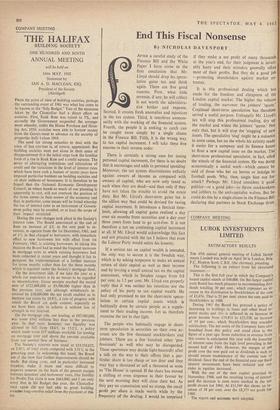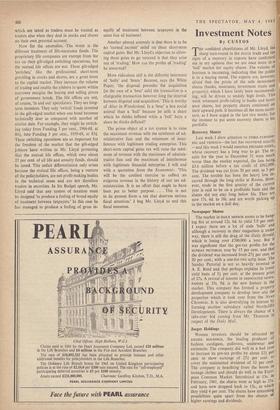End This Fiscal Nonsense
By NICHOLAS DAVENPORT There is certainly a strong case for taxing personal capital increment, for there is no doubt that it encourages and adds to personal spending. Moreover, the tax system discriminates unfairly against owners of income as compared with owners of capital, who are now only taxed as such when they are dead—and then only if they have not taken the trouble to avoid the estate duty. But Mr. Lloyd's short-term gains tax is the silliest way that could be devised for taxing capital increment. It introduces a farcical time- limit, allowing all capital gains realised a day over six months from securities and a day over three years from land to go scot-free. It is not therefore a tax on continuing capital increment at all. If Mr. Lloyd would acknowledge this fact and not proceed with the tax I believe that even the Labour Party would salute his honesty.
If a serious tax on capital wealth is intended, the only way to secure it is the Swedish way, which is by asking taxpayers to make, an annual return of their capital as well as their income and by levying a small annual tax on the capital assessment, which in Sweden ranges from 0.8 per cent. to 1.5 per cent. Mr. Lloyd can properly reply that it was neither his intention nor the policy of his party to tax capital wealth. He had only promised to tax the short-term specu- lation in certain capital assets which is habitually done by certain people as a supple- ment to their trading income. Let us therefore examine the tax in that light.
The people who habitually engage in short- term speculation in securities on their own ac- count are the few thousand stockbrokers and jobbers. There are a few hundred other 'pro- fessionals' as well who may be disregarded. These sportsmen may decide light-heartedly after a talk on the way to their offices that a par- ticular share is too cheap or too dear and they may boy a thousand or sell a thousand as soon as `The House' is opened. If the share has moved a shilling or even sixpence in their favour by the next morning they will close their bet. As they pay no commission and no stamp, the small profit per Aare is made worth while by the frequency of the dealing. I would be surprised if they make a net profit of many thousands at the year's end, for their judgment is invari- ably hasty and their mistakes generally offset most of their profits. But they do a good job —protecting shareholders against market ex- tremes.
It is this professional dealing which has made for the freedom and cheapness of the London capital market. The higher the volume of trading, the narrower the jobbers' quote.' Co9tinual short-term speculation has therefore served a useful purpose. Unhappily Mr. Lloyd's tax will stop this professional trading, dry uP the market and widen the jobbers' quote.' Not only that, but it will stop the 'stagging' of new issues. The speculative 'stag' might be a nuisance in some cases, but on the whole his activity made it easier for a company and its finance house to float a new capital issue on the market. The short-term professional speculator, in fact, oiled the wheels of the financial system. He was doing economically a useful work—which cannot be said of those who bet on horses or indulge in football pools. Why, then, single him out for attack? Perhaps Mr. Lloyd considers it good politics—or a good joke—to throw stockbrokers and jobbers to the anti-capitalist wolves. But he could do this by a single clause in the Finance Bill declaring that partners in Stock Exchange firms which are taxed as traders must be treated as traders also when they deal in stocks and shares on their own personal account.
Now for the anomalies. The worst is the different treatment of life-assurance funds. The proprietary life companies are exempt from the tax on their gilt-edged switching operations, but the mutual life offices are not. These gilt-edged 'switches,' like the professional short-term gambling in stocks and shares, are a great boon to the capital market. They increase the volume of trading and enable the jobbers to quote within narrower margins the buying and selling prices of government bonds. The life offices are not, of course, 'in and out' speculators. They are long- term investors. They only 'switch' funds invested in the gilt-edged market when one bond becomes technically dear as compared with another of similar date. For example, they might be switch- ing today from Funding 3 per cent., 1966-68, at 86i, into Funding 3 per cent., 1959-69, at 831. These switching operations are so important for the freedom of the market that the gilt-edged jobbers have written to Mr. Lloyd protesting that the mutual life offices, which own about 25 per cent. of all life and annuity funds, should be taxed. This unfair differentiation only arises because the mutual life offices, being a venture of the policyholders, are not profit-making bodies in the technical sense and are not therefore traders in securities. In his Budget speech, Mr. Lloyd said that any system of taxation must be designed 'to produce a feeling of broad equity of treatment between taxpayers.' In this case he has managed to produce a feeling of gross in- equity of treatment between taxpayers in the same line of business!
Another absurd anomaly is that there is to be no 'earned income' relief on these short-term capital gains. But Mr. Lloyd's objection to allow- ing these gains to go untaxed is that they arise out of 'trading.' How can the profits of 'trading' be unearned?
More ridiculous still is the different treatment of 'bulls' and 'bears.' Because, says the White Paper, 'the disposal precedes the acquisition [in the case of a 'bear' sale] the transaction is a chalrgeable transaction however long the interval between disposal and acquisition.' This is worthy of Alice in Wonderland. Is a 'bear' a less social animal than a 'bull' because he sells a share which he thinks inflated while a 'bull' buys a share he thinks deflated?
The prime object of a tax system is to raise the maximum revenue with the minimum of ad- ministrative fuss and the minimum of inter- ference with legitimate trading enterprise.. This short-term capital gains tax will raise the mini- mum of revenue with the maximum of adminis- trative fuss and the maximum of interference with legitimate financial enterprise. I will end with a quotation from the Economist: 'This will be the costliest exercise to collect an exiguous revenue in the history of our tax ad- ministration. It is an effort that ought to have been put to better purpose. . . . This is not in its present form a tax that deserves serious fiscal attention.' I beg Mr. Lloyd to end this fiscal nonsense.







































 Previous page
Previous page